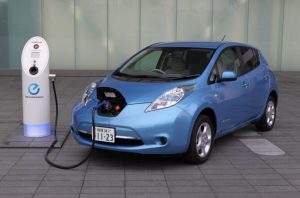
Initial registrations of electric vehicles (new and used) in Ukraine in 2020 decreased by 1% (or 87 units) compared to 2019, to 7,455 units, including 91.3% used cars (6,803), according to the Ukrautoprom association.
According to the data on its website, 7,095 passenger cars (of which only 9% are new), 359 commercial vehicles (3% new) and one electric bus (manufactured in 2019) were registered over the year.
At the same time, the average age of the used electric registered passenger cars was five years last year, of commercial vehicles seven years.
Thus, compared to 2019, the registration of used cars in 2020 decreased by 2% (by 135 cars), and new ones increased by 8% (or by 48 cars).
The most popular electric vehicle in Ukraine remains Nissan Leaf with 2,180 registrations, the second place is taken by Tesla Model 3 (some 865 cars), and the third by Tesla Model S (753 cars). The fourth position is taken by Chevrolet Bolt with 474 registrations, and the Tesla Model X closes the top five most popular zero-emission vehicles with 366 registrations per year.
The best result for new electric vehicle sales was shown by Audi E-Tron, which was chosen by 122 buyers.
The commercial electric vehicle market was dominated by Renault Kangoo Z.E. with 304 registrations, including only seven new ones.
The association also said that in December 2020, the Ukrainian vehicle fleet was replenished with 632 electric vehicles, which is 8% more than a year earlier, including 598 cars (more by 7% compared to December 2019) and 34 commercial (more by 36%).
The share of used cars in December last year in the passenger segment was 86%, in the commercial segment 97%.

Initial registrations of electric vehicles (new and used) in January-November 2020 decreased by 2% compared to the same period in 2019, to 6,823 units, including 92% of used cars, the Ukrautoprom association reports.
Thus, in the 11 months, the market of electric vehicles turned to negative dynamics, while over the ten months there was still a slight increase (by 1%), despite the drop in sales in October by 15%, and in the seven months, the growth was 7%.
This situation is due to the fact that, according to the association, in November compared to the same month of 2019 the number of registrations of electric cars decreased by almost 28% from November 2019, to 514 units (481 passenger cars and 33 commercial vehicles), which is also almost 22% less than in October 2020.
However, at the same time, the report states, the share of new cars increased to 10% from 6% in November last year, used electric cars from abroad were purchased by 461 persons (31% less than a year earlier), while the demand for new cars rose by 29%, to 53 units.
The most popular passenger electric car remains Nissan Leaf (126 cars were bought in November). The top five cars also include Chevrolet Bolt with 69 units, Tesla Model 3 with 55 units, Tesla Model S with 36 cars, and BMW i3 with 23 vehicles.
Commercial electric vehicle statistics for November were formed by Renault Kangoo Z.E. with 26 vehicles and NISSAN e-NV200 with seven units.

The Verkhovna Rada of Ukraine has approved some fiscal incentives for the development of electric transport in Ukraine, in particular, VAT and import duty exemption from 2021 until 2028 for equipment and spare parts for own production of electric transport (passenger cars, electric buses, electric trucks and special-purpose vehicles).
Bill No. 3476 amending the Tax Code and bill No. 3477 amending the Customs Code were passed at the first reading by 316 and 308 lawmakers respectively.
The proposed exemption will not apply only to equipment for the production of trolleybuses, because their output has already been established in Ukraine.
In addition, bill No. 3476 proposes to exempt the electrical industry companies selling electric motors for the production of electric vehicles (with the exception of trolleybuses), lithium-ion batteries, chargers, as well as automobile companies selling electric cars of their own production from paying income tax until December 31, 2033.
The bill proposes to extend or expand benefits for importers and buyers of electric vehicles.
It is proposed, in particular, to extend the VAT exemption for import and/or supply of electric cars until December 31, 2025 (currently the benefit is valid until the end of 2022).
A buyer of an electric car before December 31, 2030 is also offered to be exempted from paying the mandatory pension insurance fee, be provided with a tax discount on the payment of personal income tax, but these standards are proposed to be introduced from January 1, 2026.
According to an explanatory note to the bills, there is a sufficient industrial potential of Ukraine in the production of electric vehicles. In particular, there are five bus plants, a truck plant, and the facilities, which produce 300,000 passenger cars at three plants.
However, today the government is stimulating the import of electric vehicles, not their production. In particular, from January 1, 2016, there is no import duty, exemption from VAT is extended until 2022 and the excise rate is set at EUR 1 per 1 kW/h of battery capacity.
“The introduction of preferential taxation increased the import of electric vehicles from 1,706 vehicles in 2016 to 7,542 vehicles in 2019, but used electric vehicles are dominating in the market (93% in 2019),” the authors of the bills said.
ELECTRIC VEHICLES, EQUIPMENT, IMPORTED, PARLIAMENT, PRODUCTION

The registrations of new and used electric vehicles in Ukraine in January-June of this year increased by 16% compared to the same period in 2019, to 3,384 units, the Employers’ Federation of the Automotive Industry of Ukraine has reported.
According to data with reference to the Interior Ministry, in the second quarter of the current year, registrations increased by 10%, to 1,776 units.
The association clarifies that registrations included the initial registration and registration of vehicles brought from abroad by customs or on customs clearance certificates (not included in statistics of re-registration and temporary registration), while the share of primary registrations accounted for 24% (against 29% a year earlier).
Nissan is steadily leading the market, which covers 39% of the market, although the registrations of these cars decreased by a quarter from the first half of 2019, to 1,168 units.
At the same time, Tesla significantly strengthened its presence, occupying 30% of the market and increasing registration rates by 2.5 times, to 909 cars.
The third position in the ranking by a large margin from the leaders is occupied by Chevrolet with a market share of 6% and an increase in registrations of 68%, to 181 units.
The next two brands Volkswagen and Fiat ranked fourth and fifth in the ranking with indicators of 5% each, displacing the position of BMW.
The most popular models in the first half of the year were Nissan Leaf (34%), Tesla Model S and TESLA Model 3 (10% each), and the latter tripled registration to 347 units.
The fourth most popular car was Chevrolet Bolt Ev (5%), the fifth Volkswagen e-Golf (4%).